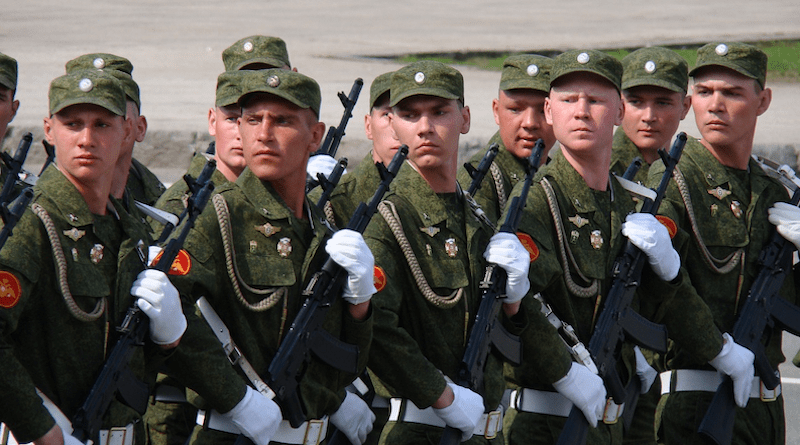Why Russia’s Mobilization May Be An Ineffective Move – OpEd
By Arab News
By Dr. Diana Galeeva*
President Vladimir Putin on Friday declared “four new regions of Russia,” consisting of two pro-Russian “republics” in Donetsk and Luhansk in the east of Ukraine, along with Zaporizhzhia and Kherson in the south. A week prior to referendums being held in these regions, a partial mobilization was introduced by the Russian leadership, calling up 300,000 reservists with military experience. Reportedly, while Putin was giving his speech in the Kremlin on Friday, stating that the people of these territories had made their choice, the first Russian citizens called up due to this partial mobilization arrived in one of the republics — Donetsk. What does this mobilization mean for the conflict? Will this decision broadly escalate the war?
Also on Friday, Ukrainian President Volodymyr Zelensky stressed that Ukraine was applying for NATO membership in an accelerated manner. Prior to the votes in Donetsk, Luhansk, Zaporizhzhia and Kherson, Zelensky said that dialogue with Russia would be impossible after the referendums took place. Earlier, Zelensky also mentioned that an eighth wave of EU sanctions against Russia was expected and that he wanted the West to increase its military aid as a response to these “fake referendums.”
President Joe Biden commented that the US would always respect the internationally recognized borders of Ukraine and support Kyiv’s efforts to regain control of its territory, both militarily and diplomatically. The US president also confirmed the allocation of the next tranche of military assistance totaling $1.1 billion and signed a bill passed by Congress that allocated another $12 billion to supporting Ukraine.
Clearly, the partial mobilization from one side and expected further support for the other will only escalate the war further.
From one angle, this scenario seems crystal clear, but there is one issue to consider: The readiness of Russians to defend these “new” territories. There are many different ways for people to express their position, with some aiming to stop the mobilization. For example, a resident of Ust-Ilimsk in the Irkutsk region fired at a military enlistment office and seriously wounded the commissar.
A day earlier, spontaneous protests against partial mobilization, led by women, broke out in Makhachkala. Women in hijabs crowded together and chanted “No to war.” The next day, the protests continued, with residents of Khasavyurt and Makhachkala taking to the streets.
While women in Dagestan attempted to save their sons and husbands from being called up, men from other regions were simply leaving the country. State Duma Speaker Vyacheslav Volodin even suggested picking up the cars abandoned at the border by those who had left Russia due to the threat of mobilization and giving them to military families. Reportedly due to such mass emigration, Finland, the closest nation to St. Petersburg, closed its borders to Russians.
The general environment in Russia is one of fear and uncertainty. Nobody expected that the war would involve further phases of partial mobilization. People now expect that this is only the beginning and that this partial call-up will lead to further mobilization. Russians also understand the consequences if their country were to suffer further military setbacks — that war might come to “real” Russian territories. There are also the nuclear threats that have become a common discussion in daily life and media coverage.
At the same time, it is quite clear that Russian men of the 21st century are not ready to go to war. It was easier to support the “special operation” in Ukraine via the media or to show neutrality to the country, but not to go to war. It is perhaps only the head of Chechnya, Ramzan Kadyrov, who enthusiastically stated that the republic “overfulfilled by 254 percent” its mobilization. This republic has a strong history of military activities due to the two Chechen wars. But, in general, having an awareness of the Russian environment, most people expected a scenario similar to the 2014 annexation of Crimea, not the current developments of the war in 2022.
In other words, it seems that relying on the mobilization policy might be an ineffective strategic move by the Kremlin. Instead, using military forces that are already in existence, such as the Wagner Group, which was used in Syria or Libya, or other military proxies, including from the Middle East, to fight for Russia would bring more effective results. Modern Russians, as opposed to their grandfathers, would probably prefer to work harder under ongoing sanctions than go to war. Consequently, proxies and other countries’ forces, which can be paid, might be a better solution for the Kremlin.
- Dr. Diana Galeeva was an academic visitor to St. Antony’s College, Oxford University (2019-2022). She is the author of two books: “Qatar: The Practice of Rented Power” (Routledge, 2022) and “Russia and the GCC: The Case of Tatarstan’s Paradiplomacy” (I.B. Tauris/Bloomsbury, 2023). She is also a co-editor of the collection “Post-Brexit Europe and UK: Policy Challenges Towards Iran and the GCC States” (Palgrave Macmillan, 2021). Twitter: @diana_galeeva

